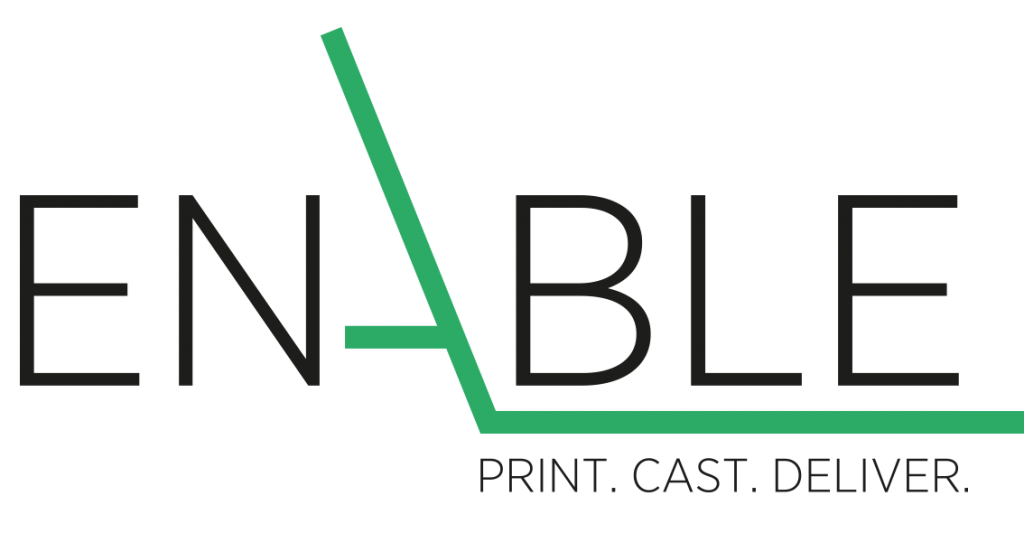Enable’s Technical Information
Metal and 3D Printing Product info
Tech Info for 3D Printed Castings
View our technical information for the services and products we offer. If you would like to speak to us directly regarding the technical information below please get in contact with us.
Quality Standards | Materials | Part Sizes | Complexity | Machining | Surface Finish | Tolerance | Holes & Slots | Sharp Corners | Wall Thickness
Quality Standards
Enable Manufacturing uses a hybrid between 3D printing and casting. The end component will meet standard casting specifications, these vary slightly for each alloy (please see material data sheet for details). General guidelines are below.
Materials
We can produce parts in any metal. Our online tool lists standard materials so if what you need is not listed please get in touch.
Part Sizes
We can produce any size component. Our online tool is for fast pricing and so limited to 250mm part size. If your component is larger please get in touch and we can arrange this for you.
Complexity
Our hybrid between additive and traditional manufacturing can produce very complex parts for a fraction of the cost of directly printing metal. The process does have a few limitations such as cavities or fine meshes/lattices. If you have very complex cavities or lattice that would be difficult to clean out with air/fluid washing then it may be difficult for us. Please send us the CAD file for review.
Machining
As standard we provide an “as cast” part, this means the surface finish, feature definition and tolerances are as you would expect from a cast part (general details below). To achieve something different, such as to ensure flatness and accuracy of a mating surface or to tap holes, it is a normal process to then machine certain features of the part. We recommend a 2mm addition to surfaces that require machining for “machining stock”. Please add this to your CAD design before sending it to us.
Machining is available from thousands of well-established supplier companies and so not something we can add any specific value to. Therefore, it is not a standard service that we provide. However, we can arrange it for you if you need it and don’t have a supplier, please get in touch.
Surface Finish
The surface finish will vary slightly with the alloy used but will typically be about 9um ra. If you require a different surface finish this can be achieved by post processing such as machining or polishing. These services are available from many supplier companies and so not something we offer ourselves. However, if you need us to arrange this for you please get in touch.
Tolerance (in accordance with VDG P690 D1)
0-6mm±0.25
6-10mm±0.36
10-18mm±0.44
18-30mm±0.52
30-50mm±0.80
50-80mm±0.90
80-120mm±1.10
120-180mm±1.60
180-250mm±2.40
250-315mm±2.60
Holes & Slots
To achieve a slot or blind hole without machining they should not be any deeper than they are wide, the bottom of a slot or hole should contain a radius as opposed to a sharp internal corner. If you need a feature that does not meet these guidelines then machining will be required.
Sharp Corners
As a guide all corners will have a small radius that is dependant on the alloy and the geometry of the part. If you need very sharp corners please get in touch, we can assess whether machining is required or not.
Wall thickness
Wall thickness is governed by the viscosity of alloy and the geometry of the part. We need the metal to flow down the narrow wall. As a general rule we can easily produce wall thickness down to 2mm. Our online tool will identify areas will walls thinner than that, if they are thinner you may find that metal does not fill this area. If you need thinner walls then please get in touch, we may be able to achieve it.

